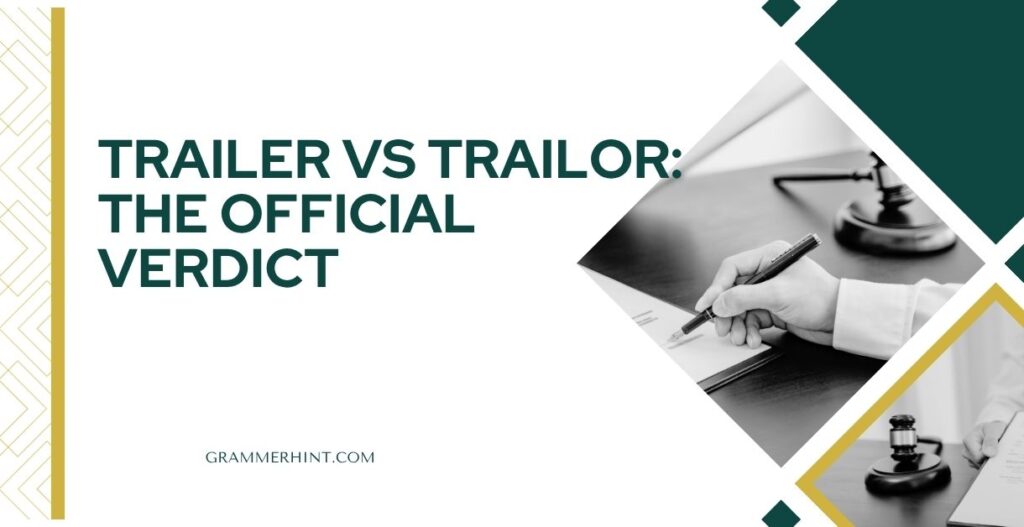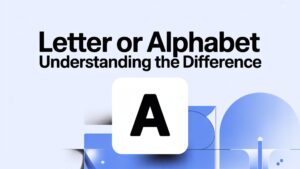In the world of written English, spelling accuracy matters not only for clarity but also for professionalism. A common mix-up that confuses many writers is between “trailer” and “trailor.”
You might see both floating around online or in informal settings, but one is undeniably the correct spelling, while the other is simply an error.
Let’s clear up the confusion once and for all.
What Does “Trailer” Mean in English?
The word “trailer” has multiple meanings, depending on the context. In general usage, it refers to something that trails behind or follows something else. Here’s how it’s commonly used:
- A towed vehicle attached to a truck or car to carry goods, equipment, or vehicles.
- A mobile home or camper, often parked in a trailer park.
- A movie preview or teaser clip used in film promotion to generate interest in an upcoming film.
In each of these meanings, “trailer” is the correct spelling.
Why Is “Trailor” a Misspelling?
The term “trailor“ is not recognized in standard English dictionaries. It’s a spelling mistake likely caused by phonetic confusion. People hear the word spoken and assume it ends in “-or” rather than the correct suffix “-er.”
This error may also stem from other English words that end in “-or,” leading to spelling confusion.
Trailer vs Trailor: The Official Verdict

There is no such word as “trailor” in standard English. The only grammatically accurate and lexically correct form is “trailer.” Whether you’re talking about a towed vehicle or a movie advertisement, always use “trailer.”
Email Example: Clarifying Usage in Business
Subject: Delivery Update for Equipment Trailer
Hi Sarah,
The utility trailer carrying the landscaping tools will arrive by 3 PM today. Just wanted to clarify that we used a heavy-duty trailer, not a mobile home trailer, for this delivery.
Let me know if there are any unloading concerns.
Best,
Jason
Notice how using “trailor” here would make the message look unprofessional and incorrect.
Trailer as a Noun and Verb
In addition to being a noun, “trailer” can also function as a verb, especially in informal or regional usage.
- Noun: We stored the bikes in the travel trailer.
- Verb: They trailered their boat to the lake last weekend.
This verb usage comes directly from the noun form and follows standard English spelling rules.
Suffix Usage (-er vs -or)
Understanding suffix usage in English helps eliminate a lot of common spelling mistakes. The “-er” suffix typically turns verbs into nouns—someone or something that performs an action:
- Teach → Teacher
- Run → Runner
- Trail → Trailer
The “-or” suffix is more common in Latin-derived words:
- Act → Actor
- Inspect → Inspector
Suffix Patterns: Latin vs English
- Words from Latin roots tend to end in “-or”
- Words from Old English or Germanic roots often use “-er”
Since “trail” is Germanic in origin, the correct form is “trailer.”
Etymology of the Word Trailer
The word “trailer” comes from the verb “to trail”, which means to follow or lag behind. The first usage of “trailer” referring to a towable vehicle appeared in the early 20th century. Later, it evolved into film language, where it described promotional clips that “trailed” the main feature.
Historical Language Evolution
- 1910s: Trailer first used to describe a towed cart or vehicle
- 1930s: Movie industry adopts “trailer” to mean film previews
- Modern use: Widely used in vehicle terminology and film promotion terminology
Common Spelling Mistakes: Trailor
Here are some reasons people mistakenly write “trailor”:
- Mispronunciation confusion: The word is often pronounced quickly, leading to unclear endings.
- Phonetic guessing: Assuming “-or” fits better due to similar-sounding words like “actor.”
- Spelling inconsistency across dialects: Variations in pronunciation in American vs British English can cause error, but both use “trailer” officially.
Email Example: Explaining a Common Mistake
Subject: Quick Note on Terminology
Hi Carlos,
I noticed the last order listed “trailor” in the product description. Just a heads-up—it should be spelled “trailer.” It’s a common typo, no worries!
Thanks,
Emily
Spelling Rules in English: Staying Consistent
English is full of quirks, but some spelling rules help us stay on track. One rule is:
If a verb ends in -l, the noun form is often created by adding -er, not -or.
Examples:
- Travel → Traveler
- Juggle → Juggler
- Trail → Trailer
Trailer in Entertainment: Movies and More

In the film industry, a trailer is a short promo clip that previews a coming attraction. It’s also called a:
- Teaser
- Sneak peek
- Promo
- Clip
- Movie advertisement
These terms all point to the same concept: generating buzz about a movie.
Email Example: Film Studio Usage
Subject: Final Cut of the Movie Trailer
Hi Martin,
We’ve finalized the trailer for our upcoming feature. The teaser will go live on YouTube tomorrow, and the full promo hits theaters next week.
Let me know if you need any last-minute edits!
Cheers,
Tina
Regional Language Differences: American vs British Spelling Conventions
Interestingly, there’s no difference between American and British spelling when it comes to “trailer.” Both varieties agree on the correct spelling of trailer.
However, the type of trailer may be described differently:
- UK: “Caravan” instead of “travel trailer” or “camper”
- US: “Mobile home” or “RV”
Table: Regional Terminology Differences
| Context | US Term | UK Term |
|---|---|---|
| Towable Home | Travel Trailer | Caravan |
| Movie Preview | Trailer | Trailer |
| Large Vehicle | Hauler/Tractor | Lorry/Haulage |
Use of Trailer in Sentence
Let’s explore some practical examples to reinforce correct word usage:
- We hauled the equipment using a utility trailer.
- The movie trailer was better than the film.
- They live in a mobile home trailer in the new trailer park.
- We rented a camper for the weekend getaway.
- The travel trailer was surprisingly spacious.
Incorrect:
- We watched the new horror trailor. ❌
- The trailor broke down on the highway. ❌
Summary: Trailer vs Trailor
Here’s a quick recap:
| Term | Is It Correct? | Usage Example |
|---|---|---|
| Trailer | ✅ Yes | We rented a trailer to transport goods. |
| Trailor | ❌ No | Common spelling mistake. Avoid using it. |
Key Takeaways:
- “Trailer” is the only correct spelling.
- “Trailor” is an orthographic error.
- Understand suffix usage in English to avoid similar mistakes.
- Use context clues: If it follows or tows, it’s a trailer.
- Recognize regional variations, but the spelling remains the same.
Final Thought
English can be tricky, especially when it comes to spelling consistency, phonetic confusion, and regional language differences. But in the case of “trailer or trailor”, the answer is simple: “Trailer” is always right.









